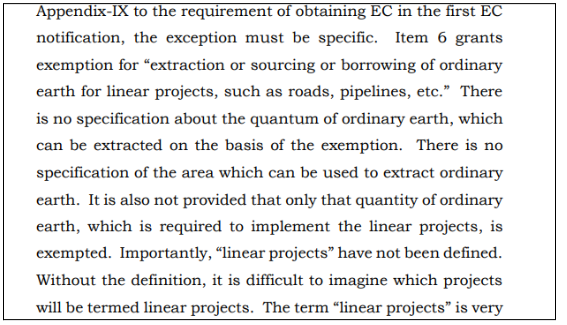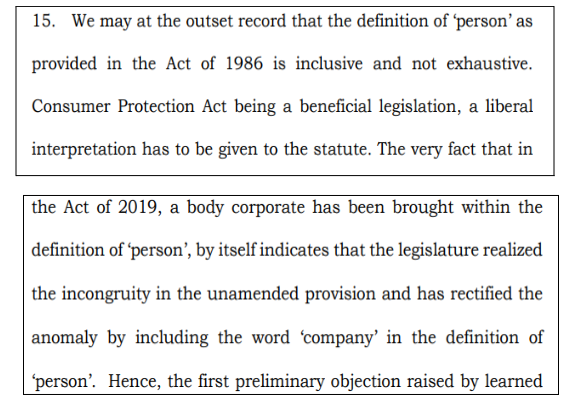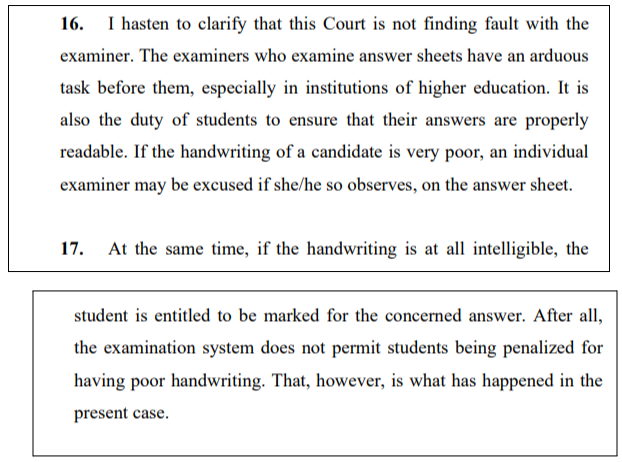In this week’s review of important court judgments, we look at the SC ruling that sexual orientation and gender identity fall in a core zone of privacy of an individual, and the directions issued to lower courts while dealing with similar cases, SC ruling that exemption of extraction, sourcing or borrowing of ordinary Earth for linear projects from environmental clearance is arbitrary.
SC: Sexual orientation and gender identity fall in a core zone of privacy of an individual
In the case of Devu G Nair vs. State of Kerala and Ors, the Supreme Court (SC) was dealing with a Special Leave Petition (SLP) filed against the interim direction of the Kerala High Court in a Habeas Corpus case. The facts of the case were that the Appellant has filed the petition with the claim that the corpus person (x), a female person, and she are in an intimate relationship. The parents of person “x” have kept her forcefully with them though she wished to remain with the Appellant. The SC noted that during the processes of investigation and counselling, the person “x” has already deposed before the court stating that she is staying with her parents voluntarily and without any coercion. Though it is true that the Appellant is an intimate friend to her, she however does not wish to marry or live with any person for the time being. Accordingly, the Court dismissed the SLP as non-maintainable.
In the same case, the SC has noted that the High Courts have been issuing orders for counselling in similar cases and in a similar position as that of person X in the matter before it. In order that the process of counselling and the pertinent orders passed by the lower courts do not affect sexual orientation of the persons involved, the SC held that judges must avoid a tendency to substitute their own subjective values for the values which are protected by the Constitution.

Accordingly, the SC has issued guidelines to the lower courts dealing with similar cases and directed following them in letter and spirit:
- Habeas Corpus petitions must be given priority in listing, courts must avoid adjourning or delaying the disposal of the matter.
- Courts should facilitate free, friendly, compassionate and uncoerced dialogue. The corpus should be given in-person interaction with the judges and the proceedings must be recorded, transcribed, and secured to not give access to any other party.
- The courts must ensure that the wishes of the person are not unduly influenced by court or police or natal family. The persons alleged of detention, including family, should not be present during the course of proceedings.
- The court must acknowledge that some intimate partners may face social stigma and a neutral stand of the law would be detrimental to the fundamental freedoms of the appellant. Therefore, a court while dealing with a petition for police protection by intimate partners on the grounds that they are a same sex, transgender, inter-faith, or inter-caste couple must grant an ad-interim measure, such as immediately granting police protection to the petitioners, before establishing the threshold requirement of being at grave risk of violence and abuse. The protection granted to intimate partners must be with a view to maintain their privacy and dignity.
- The Court shall not pass any directions for counselling or parental care when the corpus is produced before the Court. The role of the Court is limited to ascertaining the will of the person. The Court must not adopt counselling as a means of changing the mind of the appellant, or the detained/missing person.
- The Judge during the interaction with the corpus to ascertain their views must not attempt to change or influence the admission of the sexual orientation or gender identity of the appellant or the corpus. The court must act swiftly against any queerphobic, transphobic, or otherwise derogatory conduct or remark by the alleged detainers, court staff, or lawyer.
- Sexual orientation and gender identity fall in a core zone of privacy of an individual. These identities are a matter of self-identification, and no stigma or moral judgment must be imposed when dealing with cases involving parties from the LGBTQ+ community. Courts must exercise caution in passing any direction or making any comment which may be perceived as pejorative.
SC: Refuses to Stay Election Commissioners’ Act, citing that it would disrupt the 18th Lok Sabha Elections
In the case of Dr. Jaya Thakur and Ors vs Union of India & Ors, the SC refused to stay the operation of the recently passed Chief Election Commissioner (CEC) and Other Election Commissioners (OEC) Act, 2023 (Act). The facts of the case were that the Parliament had passed CEC & OEC Act which modified the operation of the previous position of law on the appointment of Chief Election Commissioners and Other Election Commissioners (CEC & ECs). By virtue of this Act, the Chief Justice of India (CJI) is replaced by the Union Cabinet Minister, appointed by the Prime Minister (PM), in the selection committee involved in the appointment of CEC and ECs. The petition was filed challenging the Act on various grounds such as removal of CJI in the selection process, violation of SC’s judgment in Anoop Baranwal vs. Union of India, etc., among others, which would affect the fairness and transparency in the appointment of CEC and ECs.
The SC refused to stay the operation of the Act by stating that any such order for the time being would affect the upcoming 18th Lok Sabha elections. That apart, the judgment passed by SC in the Anoop Baranwal case was when there was an absence of Specific Law in the appointment of CEC and ECs, though it was mandated by the Constitution of India. Further, when entertaining any petition relating to the constitutionality of a law, the courts are cautious and follow the judicial restraint in giving the interim orders. With these reasons, the court refused to grant a stay on the operation of the Act. However, the court has also held that it does not wish to go into depth of details of the challenge to the Act, considering that the elections are going to be held in the coming months and that any contrary order would disrupt the election process.

SC: Exemption of Extraction, Sourcing or Borrowing of Ordinary Earth for linear projects from the Environmental Clearance is Arbitrary.
In the case of Noble M. Paikada vs. Union of India, the SC was dealing with a challenge to the judgment of the National Green Tribunal (NGT), where it had upheld the amendment of the Environmental Impact Assessment (EIA) Notification, a sub-legislation passed under Environment Protection Act (EPA), by Ministry of Environment, Forests and Climate Change (MoEF&CC). The facts of the case were that by amendments dated 28 March 2020 and 30 August 2023 to the EIA Notification, the MoEF&CC exempted the prior environmental impact assessment and obtainment of Environmental Clearance (EC) for extraction, sourcing or borrowing of Ordinary Earth for linear projects. This was challenged before the NGT, which had upheld the operation of the same notification. Hence, an Appeal against the notification and the judgment of the NGT was filed by the petitioners before the SC with the grounds such as permitting the extraction of earth without any limitation is arbitrary and violative of Article 14 of the Constitution of India – The Right to Equality. Further, it is also in violation of the SC’s judgment in Deepak Kumar & Ors vs. State of Haryana & Ors, wherein it was held that mining or minor minerals even below the 5 hectares require the prior EC from the statutory authorities.
The SC noted that the impugned notification was issued a few days before the lockdown was announced in India, as such there was no hurry in passing the modification. Further, the EIA Notification does not define a list of activities which are constituted as “linear projects”. In addition, it also does not define the quantum of the earth which when extracted, sourced, or borrowed is considered to not have an environmental impact. Hence, it was struck down as being held as arbitrary and violative of Article 14 of the Constitution.

SC: Corporate Bodies are covered in the definition of ‘Person’ under Consumer Protection Act
In the case of M/s Kozyflex Mattresses Private Limited vs. SBI General Insurance Company & Anr, the SC held that corporate bodies are entitled to file complaints and claim relief under the Consumer Protection Act (CPA). The facts of the case were that in March 2013, the M/s Kozyflex Mattresses Private Limited (Appellant) had bought an insurance policy ‘Standard Fire and Special Perils Policy (Material Damage)’ to the tune of 1.25 crores on the plant and machinery and a sum of Rs. 30,00,000 on stock from SBI general insurance company (Respondent). Subsequently, it was enhanced to Rs. 1.55 crores, and for the building the sum insured was enhanced to Rs. 20,00,000. Thereafter, as per the Appellant, a massive fire accident took place in the manufacturing unit which has caused him financial damages. Therefore, he claimed relief of Rs. 3.31 crores; Rs. 40,11,152/- for building, Rs.1,08,47,435/- for plant and machinery and Rs.1,87,72,489/- for stock, from the Respondent. Upon the inspection, the Respondent found the claim as fraudulent and based on fabricated documents and hence was repudiated. The Appellant approached the National Consumer Disputes Redressal Commission (NCDRC), which upheld the rejection of the claim by SBI. This order of NCDRM was then challenged by the Appellant in SC.
When the matter was taken up by SC, the counsel for the Appellant argued that they were not given sufficient opportunity by the NCDRC to produce documentary evidence to substantiate their grievance and financial claim. The counsel for Respondent submitted that the Appellant being a body corporate does not get covered under the definition of ‘person’ under the Consumer Protection Act (CPA), as amended in 2019. However, the SC held that the definition of a person covered in CPA is inclusive and not exhaustive. The same amended act in 2019 stipulates body corporate as a person by including the word ‘company’. Therefore, the Appellant being considered as ‘Person’, though a corporate body, is entitled to complain and claim grievance redressal under CPA.

As regards the merits of the case, the SC agreed with the contention of the Appellant and remanded the matter back to NCDRC for re-hearing and to decide afresh
Delhi HC: Students should not suffer examiner’s remarks of Handwriting as not intelligible.
In the case of Madhav Chaudhary (Appellant) vs. University of Delhi & Anr (Respondent), the Delhi High Court (HC) held that the students should not be allowed to suffer from improper evaluation of examination papers, due to the not intelligible handwriting remarks made by the examiners. The facts of the case were that the Appellant had filed a Writ Petition (WP) against the Respondent seeking the direction for re-evaluation of his answer sheet in the supplementary examination held by the Respondent. The grievance of the Appellant was that the examiner, who corrected his answer sheet, had remarked in it stating, “very poor handwriting, hardly could read anything” and therefore, it had affected the marks secured by him in the exam. In defence, the respondent had stated that in portions where such remarks were made, the examiner had given marks to the Appellant. Further, the respondent has also submitted that there is no provision in the rules which provides re-evaluation of the examination paper.
When the matter was taken up, the Delhi HC held that the matter pertains to the proper evaluation, not a re-evaluation, since it was the examiner’s deposition that he could not properly read what was written in the paper. Accordingly, the marks given in the paper cannot be treated in law as evaluation at all. Further, the court held those words that were not intelligible were readable and thus it also shows the improper evaluation being done. However, the Court had clarified that it is not in any way finding fault with the examiner, as examiners like him undertake the arduous task of correcting answer sheets, especially in higher education institutions. If the handwriting is abysmal, the examiners should be excused. But, in the present case, the handwriting of the Appellant is readable and as such he should not be allowed to suffer for the same reason.

Therefore, the court allowed the petitioner to provide a typed transcript to the university and the examiner was requested to evaluate the same.


